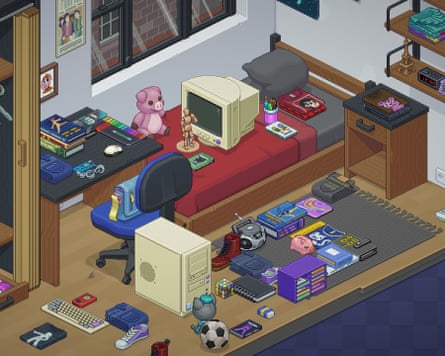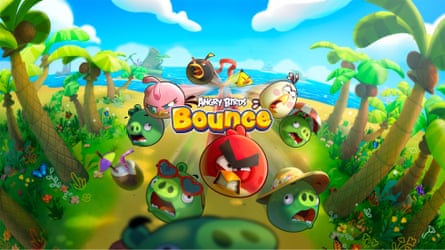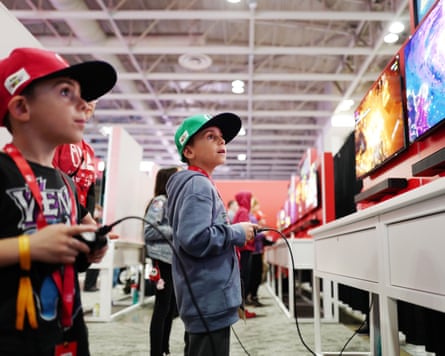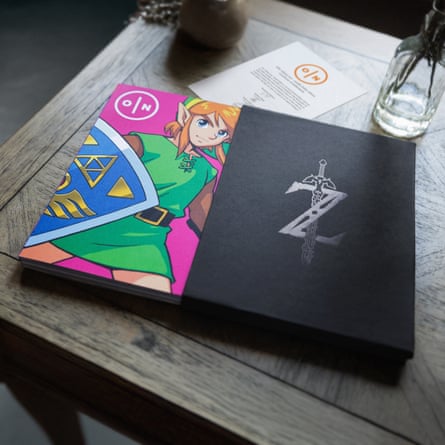For anyone looking to gauge the mood of the UK games industry in 2025, there has been only one place to hang out this week: the bar of the DoubleTree by Hilton hotel in Brighton. It’s in this building that the annual Develop conference has been bringing together developers, publishers, students and journalists since 2006 – and during the three days of talks, roundtables and keynotes, it’s in the bar that everyone meets and unloads their theories and concerns about the state of the business.
This year, after many months of cuts and closures, the mood has been dour. On Tuesday, I spoke to many coders, artists and studio heads who have had games cancelled, staff axed and deals obliterated; several senior developers predicted that the recent savage cuts to staff numbers and game projects will lead to a gaping black hole in the release schedules of many triple-A publishers in late 2026 and 2027. Grand Theft Auto VI was always going to be huge; now it’s looking like the only game in town.
But there has been optimism at the event, too. An excellent panel discussion entitled Why Cultural Recognition is Crucial to the Future of the Games Industry saw Nick Poole, CEO of the trade body Ukie, welcoming a more positive view of the industry among politicians and policymakers in Westminster. “Three years ago, understanding of games was scant, but just recently there’s been a massive amount of recognition,” he said. “Suddenly, politicians are talking to us about the educational reach of games; the power of games for young people as a channel of self-expression; we’ve seen the first games being prescribed on the NHS as a treatment for anxiety and depression – there’s a recognition that the cultural echo of games is far greater than the economic proposition.”

On the fears surrounding the use of AI, especially large language models, in game development, Cassia Curran, founder of consulting firm Curran Games Agency, had some positive advice: “The development of AI will mean there’s an abundance of content out there,” she said. “But the way that you can achieve success as a developer will be to lean into the authentic human experience you’ve lived. AI cannot reproduce your feelings or your culture, and these can be reflected in your games. In the era of AI slop, players will be looking for experiences that feel new and deeply human.”
There were also some fascinating stories of the lengths developers have been going to in the quest for authenticity. In the first talk of the day, Jens Andersson and Pete Ward from MachineGames, the creator of the acclaimed adventure Indiana Jones and the Great Circle, talked about travelling to the far north of Sweden to record a bull-whip expert cracking a whip in multiple different ways and locations to ensure Indy’s famous accessory sounded right in the game. The team behind the procedurally generated detective adventure Shadows of Doubt created a 1950s-style noir thriller called Claw of the Fathoms, which plays on the TV in the lead character’s apartment, simply to give the world an authentic feel.
The sheer range of experiences in games and a growing concern with wider representation were the overriding themes all day. Lydia Cooke, a PhD researcher specialising in queer game studies, chaired a heartening roundtable discussion entitled Representation in Games: Beyond the Surface. Cooke talked of barriers to representation in mainstream games, where atypical characters are often seen as a commercial risk. But, at the same time, audience members listed recent games that told interesting stories about marginalised and diverse characters, including the narrative puzzler Unpacking, Lesbian romance Bossgame: The Final Boss is my Heart, gender-neutral dating sim Monster Prom, and absurdist disability allegory To a T from cult game-maker Keita Takahashi. A key conclusion of the session was that identity needn’t be a central issue in a game – instead, the very presence in a game of well-drawn diverse characters may be of huge value to players who rarely see themselves represented in the media they consume.
Away from the bar, I bumped into some of my favourite independent developers and they told me about the interesting projects they’re working on – innovative, charming games built by tiny teams, by any means necessary. For the rest of the conference, there will be talks from legendary Finnish developer Housemarque on surviving 30 years in the business; and from Remedy Entertainment’s Sam Lake on his three decades of storytelling. Developers will be sharing a multitude of experiences, from creating a side quest in Marvel’s Spider-Man 2 to how they made players cry with indie game Videoverse. In short, the work goes on, people make things and people play them. This is not just an industry controlled by CEOs and shareholders, it is a culture and an art form, and it will continue.
What to play

Angry Birds is very much the Pac-Man of the mobile gaming world – a franchise that’s somehow infinitely renewable in a vast array of genres. The latest incarnation is Angry Birds Bounce, which combines the familiar slingshot-a-bird-to-hit-naughty-pigs gameplay with block-breaking classics such as Breakout and Puzzle Bobble. Simply select your favourite bird, then aim it at the screen to take out as many pigs as possible; each bird has different tactics and abilities, and the challenge ramps up nicely as you unlock new characters. Developer Rovio clearly still has enthusiasm for the series and this compelling little diversion will get you through any commute, dull movie or inescapable meeting.
Available on: Apple Arcade
Estimated playtime: All the free time you have
What to read

-
Nintendo president Shuntaro Furukawa has defended the price of the Switch 2 console at a recent shareholder Q&A. As reported in GamesIndustry.Biz, he stated that the £395.99 ($449.99) price is “appropriate for the gaming experience that it offers”. He also defended the controversial use of game-key cards: cartridges that contain no game data, but instead provide a code for the player to download the game.
-
On the subject of Nintendo, if you’re a fan of the publisher’s games and looking for an article to furiously debate with, IGN has one entitled Every Nintendo 3D Platformer, Ranked. Number four should be higher, that’s all I’m going to say.
-
The founder and former president of Arkane Studios, Raphaël Colantonio, has attacked Microsoft’s Xbox Game Pass service, which gives players unlimited access to a range of games for a monthly subscription fee. Writing on X in response to the latest round of job cuts at Microsoft, the co-creator of the acclaimed Dishonored series stated: “Why is no one talking about the elephant in the room? Cough cough (Gamepass).” He went on to call the service, “an unsustainable model that has been increasingly damaging the industry for a decade”. Read more on VGC.
after newsletter promotion
What to click
-
Three Ubisoft chiefs found guilty of enabling culture of sexual harassment
-
How to make your old Nintendo Switch games feel new again on Switch 2
Question Block

This question came to us from reader Jason:
“Someone brought up A Profound Waste of Time today and it made me think that Pushing Buttons might have mentioned a similar new publication … maybe one that you’re writing in? Would you let me know of any others so I can spread the word?”
This is my absolute favourite subject, so thank you, Jason. Keza and I have contributed to On magazine, a beautiful, design-led video game publication with a second issue out now and a third on the way.
I also love the similarly stylish Lock-On from Lost in Cult, as well as the gorgeous zines Devils Blush, Controller Revolt and Heterotopias, which all apply the punk DIY ethos to games, with a handmade look and enthusiastic writing. Forgotten Worlds publishes its own zines and has a really helpful list of independent print publications for video game fans. It’s lovely to see so many exciting and carefully curated gaming mags out there in 2025.
If you’ve got a question for Question Block – or anything else to say about the newsletter – hit reply or email us on [email protected].

 6 hours ago
5
6 hours ago
5

















































